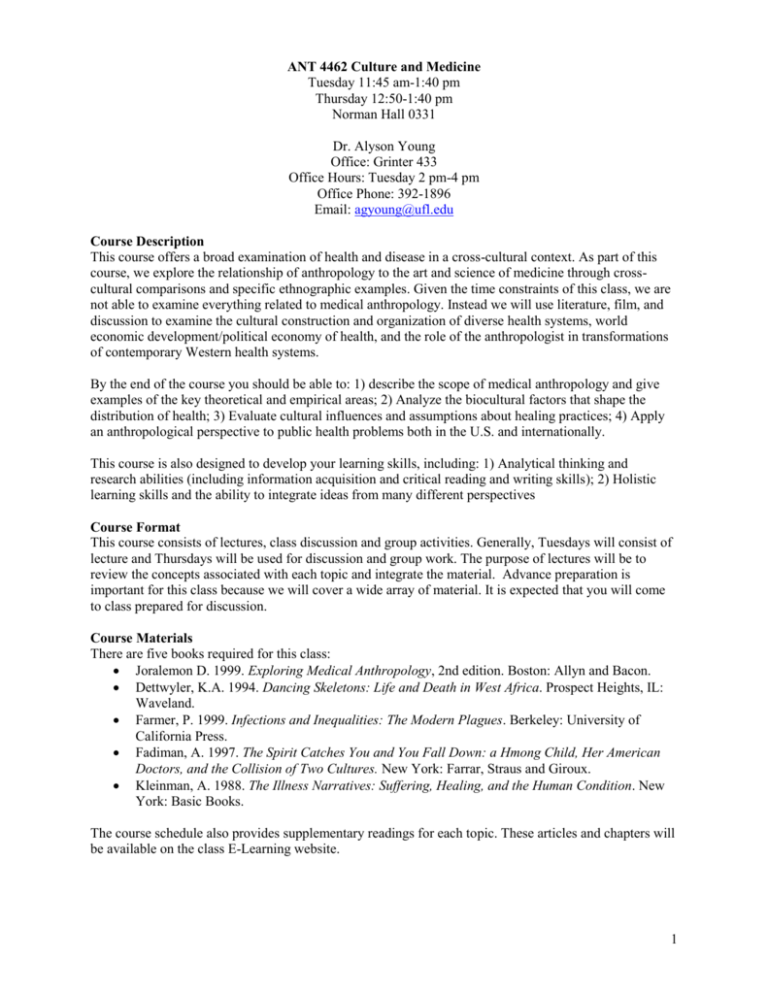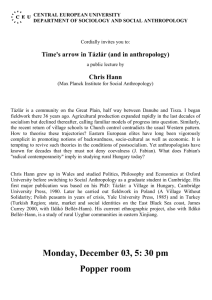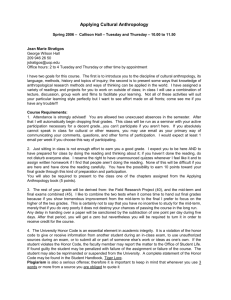Syllabus
advertisement

ANT 4462 Culture and Medicine Tuesday 11:45 am-1:40 pm Thursday 12:50-1:40 pm Norman Hall 0331 Dr. Alyson Young Office: Grinter 433 Office Hours: Tuesday 2 pm-4 pm Office Phone: 392-1896 Email: agyoung@ufl.edu Course Description This course offers a broad examination of health and disease in a cross-cultural context. As part of this course, we explore the relationship of anthropology to the art and science of medicine through crosscultural comparisons and specific ethnographic examples. Given the time constraints of this class, we are not able to examine everything related to medical anthropology. Instead we will use literature, film, and discussion to examine the cultural construction and organization of diverse health systems, world economic development/political economy of health, and the role of the anthropologist in transformations of contemporary Western health systems. By the end of the course you should be able to: 1) describe the scope of medical anthropology and give examples of the key theoretical and empirical areas; 2) Analyze the biocultural factors that shape the distribution of health; 3) Evaluate cultural influences and assumptions about healing practices; 4) Apply an anthropological perspective to public health problems both in the U.S. and internationally. This course is also designed to develop your learning skills, including: 1) Analytical thinking and research abilities (including information acquisition and critical reading and writing skills); 2) Holistic learning skills and the ability to integrate ideas from many different perspectives Course Format This course consists of lectures, class discussion and group activities. Generally, Tuesdays will consist of lecture and Thursdays will be used for discussion and group work. The purpose of lectures will be to review the concepts associated with each topic and integrate the material. Advance preparation is important for this class because we will cover a wide array of material. It is expected that you will come to class prepared for discussion. Course Materials There are five books required for this class: Joralemon D. 1999. Exploring Medical Anthropology, 2nd edition. Boston: Allyn and Bacon. Dettwyler, K.A. 1994. Dancing Skeletons: Life and Death in West Africa. Prospect Heights, IL: Waveland. Farmer, P. 1999. Infections and Inequalities: The Modern Plagues. Berkeley: University of California Press. Fadiman, A. 1997. The Spirit Catches You and You Fall Down: a Hmong Child, Her American Doctors, and the Collision of Two Cultures. New York: Farrar, Straus and Giroux. Kleinman, A. 1988. The Illness Narratives: Suffering, Healing, and the Human Condition. New York: Basic Books. The course schedule also provides supplementary readings for each topic. These articles and chapters will be available on the class E-Learning website. 1 Course Requirements and Grading There are three important components to your grade in this course: Class participation (50 pts.): Students are expected to attend each class meeting and take an active part in discussion and activities. Active participation requires that you read all assignments and prepare questions and discussion points. I will evaluate your participation on the quality of your contributions, not just the quantity of contributions. Occasionally, there will be short in-class writing exercises in which you will be asked to summarize assigned readings, suggest questions, or introduce topics for discussion. These exercises are designed to help me assess your comprehension of the material and help you hone your ability to quickly summarize class material. In-class writings will be graded on a pass/fail basis as part of your participation grade. Exams (50 pts. ea.): There are two essay exams during this course. Each exam is worth 50 points and is designed to test you comprehension of concepts a readings introduced during the course. The first of these exams is on October 9 and the second is on December 18, during exam week. These exams will include a combination of short answer and essay questions. Research paper (100 pts.): The research paper will be comprised of several components to help you develop your research and analytical skills. The basic information on the paper is presented here, additional material will be provided in class. Paper topic (10 pts.): You are required to submit an outline defining your topic of interest by the beginning of class on September 18. The outline should identify your topic and the key arguments in your paper. Do some preliminary library research to help you appropriately identify and narrow your research question. Annotated bibliography (20 pts.): You are required to submit an annotated bibliography with at least 10 key references for your paper. These references should clearly relate to your topic. In this bibliography, your annotations should briefly evaluate the source and identify how it will contribute to your research. The annotated bibliography is due at the beginning of class on October 2. Abstract (10 pts.): A 250-300 word abstract for your paper is due on October 23. This abstract should be a condensed version of your paper. It should clearly identify your thesis statement, provide an overview of the key arguments that you make in the paper, identify the evidence you will use, and identify the conclusion of your research. Draft submission (10 pts): You are required to submit a complete draft of your final paper at the beginning of class on November 6. These drafts will be returned to you on November 13. This draft should represent your best effort at developing your thesis statement into a well-organized argument that is supported by your literature review. You will have an opportunity to revise your draft after receiving feedback. Final paper (50 pts.): The final paper should be 10 pages (excluding references). Figures and tables are not necessary, but if used they should be included at the end of the paper. Papers should be double spaced in 12 pt. Times New Roman font with 1-inch margins. References should be formatted with an appropriate bibliographic style (i.e. Chicago Manual of Style, American Anthropologist style etc.) If you have questions about appropriate bibliographic format, please come see me. The final paper is due on December 4 at the beginning of class. Electronic submissions of the final paper, and components of the final paper will not be accepted. Grades: Final grades will be based on the following scale: A (90-100), B+ (87-89), B (80-86), C+(7779), C (70-76), D+(67-69), D (60-66), E (<60). Grading rubrics will be provided for each aspect of the final paper. Policy on Late Assignments You are required to complete all assignments by the stated due dates. Late assignments will lose one halfletter grade for each day past the deadline. There are no make-up opportunities for any assignment. I will not assign grades of “incomplete” except in the most unusual, extreme circumstances. You must provide documentation of such circumstances from an appropriate authority. 2 Academic Honor Code Unless it is specifically connected to assigned collaborative work, all work should be individual. Evidence of collusion (working with someone not connected to the class or assignment), plagiarism (use of someone else’s published or unpublished words or design without acknowledgment) or multiple submissions (submitting the same paper in different courses) will lead to the Department’s and the University’s procedures for dealing with academic dishonesty. All students are expected to honor their commitment to the university’s Honor Code (available online at: www.registrar.ufl.edu/catalog/policies/students.html). Accommodation for Students with Disabilities Students requesting classroom accommodation must first register with the Dean of Students Office. The Dean of Students Office will provide documentation to the student who must then provide this documentation to the Instructor when requesting accommodation. Please make any requests by the second week of class. UF Counseling Services Resources are available on-campus for students that feel like they are struggling in their personal or academic life. These resources include: University Counseling Center, 301 Peabody Hall, 392-1575, personal and career counseling Student Mental Health, Student Health Care Center, 392-1171, personal counseling Sexual Assault Recovery Services (SARS), Student Health Care Center, 392-1161, sexual counseling Career Resource Center, Reitz Union, 392-1601, career development assistance and counseling. Course Schedule and Readings This is a preliminary schedule of topics and readings. The syllabus is considered to be a guide for the course and may be subject to change with advance notice. Week 1 (Aug 26-28): Introduction Joralemon Chapters 1-2 Inhorn, M.C. (2007) Medical Anthropology at the intersections. Medical Anthropology Quarterly, 21(3): 249-255. Week 2 (Sept. 2-4): Ecology, adaptation, and evolution Joralemon Chapter 3 Wiley, A.S. (1992) Adaptation and the biocultural paradigm in medical anthropology: a critical review. Medical Anthropology Quarterly, 6(3): 216-236. Nesse, R.M. and Williams, G.C. (1998) Evolution and the origins of disease. Scientific American, 279(5): 86-93. Week 3 (Sept. 9-11): Culture, political economy, and health Sept 9: Joralemon Chapter 4 Leatherman, T. (2005) A space of vulnerability in poverty and health: political ecology and biocultural analysis. Ethos, 33(1): 46-70. Singer, M., Valentin, F., Baer, H., and Zhongke, j. (1992). Why does Juan Garcia have a drinking problem? The perspective of critical medical anthropology. Medical Anthropology, 14(1): 77-108. McElroy, A. (1996). Should medical ecology be political? Medical Anthropology Quarterly, 10(4): 512-522. Garro, L. (2000). Cultural meaning, explanations of illness, and the development of comparative frameworks. Ethnology, 39(4): 305-334. 3 Week 4 (Sept. 16-18): Health transitions Joralemon Chapter 5 Bloom, B.R. (2005). Public health in transition. Scientific American, 292(6): 92-99. Barrett, R., Kuzawa, C.W., McDade, T., and Armelagos, G.J. (1998) Emerging and re-emerging infectious diseases: the third epidemiologic transition. Annual Review of Anthropology, 27: 247-271. Gandy, M. and Zumla, A (2002). The resurgence of disease: social and historical perspectives on the ‘new’ tuberculosis. Social Science and Medicine, 55(3): 385-396. * Paper topic due in class Sept. 18. Week 5 (Sept. 23-25): Food, body, and culture Axelson, M.L. (1986) The impact of culture on food related behavior. Annual Review of Nutrition, 6: 345-363. Sobo, E. (1997). The sweetness of fat: health, procreation, and sociability in rural Jamaica. Food and Culture: A Reader. New York: Routeledge. Pp. 256-271. Gibbs, W. (2005) Obesity: An overblown epidemic? Scientific American, 292(6): 70-77. Ritenbaugh, C. (1982) Obesity as a culture-bound syndrome. Culture, Medicine and Psychiatry, 6(4): 327-363. Parker, S., Nichter, M., Nichter, M, Vuckovic, N., Sims, C. and C. Ritenbaugh (1995). Body Image and Weight Concerns Among African amerian and White Adolscent Females: Differences that Make a Difference. Human Organization, 54(2): 103-114. Week 6 (Sept. 30-Oct. 2): Nutrition, growth, and child health Entire Dettwyler book Engle, P., Bentley, M., and G. Pelto (2000). The role of care in nutrition programmes: current research and a research agenda. Proceedings of the Nutrition Society, 59: 25-35. * Annotated bibliography due in class Oct 2. Week 7 (Oct. 7-9): Infections and inequalities I Farmer Chapters 1-4 Dunavan, C.P. (2007) Awakening to global health. Health Affairs, 26(4): 1135-1140. Week 8 (Oct. 14-16): Infections and inequalities II Farmer Chapters 5-10 Week 9 (Oct. 21-23): Culture, stress, and disease Dressler, W. (2004) Culture and the risk of disease. British Medical Bulletin, 69: 21-31. Dressler, W. (1995) Modeling biocultural interactions; examples from studies of stress and cardiovascular disease. Yearbook of Physical Anthropology, 38: 27-56. Sapolsky, R. (1996) Why Stress is Bad for your Brain. Science, 273(5276): 749-750. Cassel, J. (1976) The contribution of the social environment to host resistance. American Journal of Epidemiology, 104(2): 107-123. Dressler, W. (2000) The health consequences of cultural consonance: Cultural dimensions of lifestyle, social support, and arterial blood pressure in an African American Community. American Anthropologist, 102(2): 244-260. *Abstract due in class Oct. 23. 4 Week 10 (Oct. 28-30): Racism, poverty, and health Sapolsky, R., (2005). Sick of Poverty. Scientific American, 292(12): 92-99. Krieger, N. (2003) Does racism harm health? Did child abuse exist before 1962? On explicit questions, critical science, and current controversies: An ecosocial perspective. American Journal of Public Health, 93(2): 194-199. Kahn, J. (2007) Race in a bottle. Scientific American, 297(2): 40-45. Williams, D.R. and Jackson, P.B. (2005) Social sources of racial disparities in health. Health Affairs, 24(2), 325-334. Dressler, W., Oths, K.S., and Gravlee, C. (2005). Race and Ethnicity in Public Health research: models to explain health disparities. Annual Review of Anthropology, 34(1): 231-252. Gravlee, C., Dressler W., and Bernard H.R. (2005). Skin color, social classification, and blood pressure in southeastern Puerto Rico. American Journal of Public Health, 95 (12): 2192-2197. Week 11: Embodiment Krieger, N. and Davey Smith G. (2004) “Bodies count” and body counts: social epidemiology and embodying inequality. Epidemiologic Reviews, 26: 92-103. Csordas, T.J. (1993) Somatic modes of attention. Cultural Anthropology, 8(2): 135-156. Krieger, N. (2005) Embodiment: a conceptual glossary for epidemiology. Journal of Epidemiology and Community Health, 59(5), 350-355. Csordas T.J. (1990) Embodiment as a paradigm for anthropology. Ethos, 18(1): 5-47. *Paper draft due in class on Nov. 6. Week 12 (Nov. 11-13): Meaning, mind, and body Kleinman Chapters 1-2, 5-6, 10-12 Chavez, L.R., Mc Mullin, J., Mishra, S, and Hubbell, F. (2001) Beliefs matter: cultural beliefs and the use of cervical cancer-screening tests. American Anthropologist, 103(4): 1114-1129. Moerman, D. and Jonas, W. (2002) Deconstructing the placebo effect and finding the meaning response. Annals of Internal Medicine, 136(6): 471-476. Week 13 (Nov 18-20): Healing traditions I (No class this week) Joralemon Chapter 6 Fadiman Chapters 1-7 Oldani, M. (2004) Thick prescriptions: toward an interpretation of pharmaceutical sales practices. Medical Anthropology Quarterly, 18(3): 325-356. Week 14: (Nov. 25-27) Healing traditions II (No class this week) Kleinman Chapters 7, 14-16; Fadiman Chapters 8-13 Week 15: (Dec. 2-4) Anthropology and bioethics Joralemon Chapters 8-9 Kleinman, A. and Benson, P. (2006) Anthropology in the clinic: the problem of cultural competency and how to fix it. PLoS Medicine, 3(10): e294. Marshall, P.A. and Koenig, B. (1996). Bioethics in anthropology: perspectives on culture, medicine, and morality. In C.F. sergeant and T.M. Johnson (eds.), Handbook of medical anthropology: contemporary theory and method. Pp. 349-373. *Final paper due in class on Dec. 4. Week 16: Dec. 9-11 5 Dec. 9- Exam review Dec. 11- No class (University reading day) Final Exam: Thursday Dec. 18, 7:30-9:30 am, Norman Hall 0331 6









